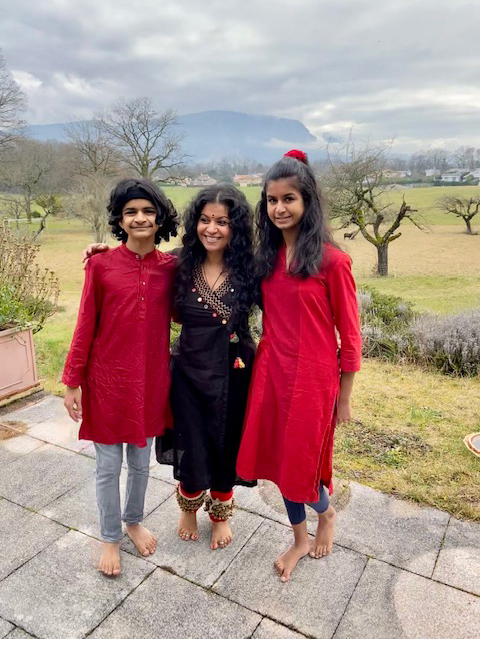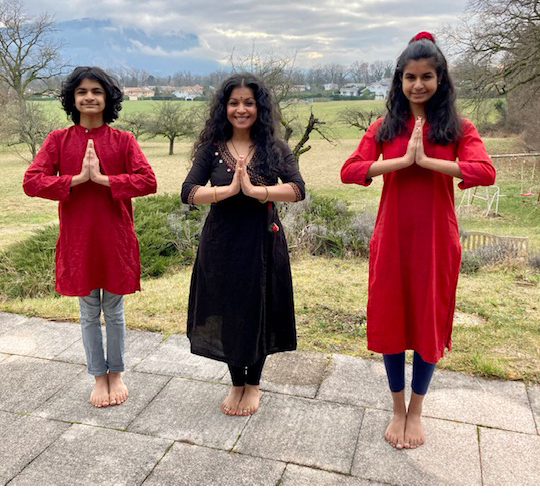How did your journey of Kathak begin?
Indu-ji: For me it’s sort of coming full circle from when I was younger. My mother, Dr. Karabi Sen, was a follower of Kathak when she was younger, but she didn’t have the opportunity to learn herself. During her college days in Kolkata, West Bengal, she had heard of Panditji and his command of the dance.
When I was around 6 years old, and my brother was about 7 or 8, she enrolled us at the School of Music in Durgapur affiliated with the Rabrindra -Bharati University of Kolkata and Prayag Sangit Samity of Allahabad. She wanted both of us to be strong dancers. At the School of Music, we happened to learn from one of Panditji’s students, Deepali Miss.
We immigrated to California in 1984 as a big family of 7. Each of the 5 children did something with regards to music. I had 4 brothers …my eldest brother played tabla; my other elder brother and I were in kathak; and, my 2 younger brothers were singing classical music.
Before leaving West Bengal, Deepali Miss had told us, “You know that Panditji is in California and you are going to be there.” When we arrived in the Bay Area, we settled around Oakland and San Francisco. We had humble beginnings as immigrants, but we did come from rich traditions in Kolkata and Tagore’s Santiniketan. My parents were sure they wanted us to continue with the arts, and enrolled me in sitar with Ustad Ali Akbar Khanji at the College of Music and kathak with Panditji at Chhandam in 1985.
I was extremely fortunate to be able to do this and of course, didn’t realize the impact all of this would have on me then. I remember Michelle Didi, Michelle Zonka, as she was also teaching at that time in San Rafael. Later I also learned in Fremont, but always with Panditji.
I was also extremely fortunate that Panditji became a close family friend. When I ask Ma, “How would you consider Panditiji?” her response is, “He was like a brother.” She describes him as someone full of life, joy, charisma and creativity, and also as very sensitive. When he lost his mother, Ma remembers how he wept on her shoulder.
That was really the rich beginning I had, and the biggest piece of gratitude must go to my parents and Ma’s passion. No matter what constraints there were, my parents made the effort for their children – whether it was Ma taking my brother and me on a cramped rickshaw for an hour to go to the School of Music in Durgapur, or whether it was Baba driving for an hour-an-a-half each way to take me after school to go to class in San Rafael or Fremont when we moved further away.
The second biggest part of my gratitude and circling back after all these years belong to Guruji. His Bengali heritage also helped me feel very close and comfortable, and feel a certain trust and bond to his teaching at that young age, especially having come to a new country. His passion, his discipline and tenderness, and dedication to his students have followed me through the years. After having moved far physically and also away from the proximity to classes under his lineage, I am back after all these years to re-learn and learn anew, this time with my kids, Auyoni and Zamaan. We live in Geneva, Switzerland, but the challenge of physical distance is, at least for now, overcome by the ability to take online classes with Leela and Chhandam.
Auyoni (16 years old): We started about few months ago and I really like it. I like how it not only involves dance but also singing. You can do more than one thing at once. I also think that the most difficult part is coordinating all of it, but its also my favorite part.
I play the piano. I can make connections between what I know in piano and what I learn in Kathak.
Zamaan (14 years old): I really like it because its expressive. You get to express all these different feelings with different movements. I also like the challenge of the dance.
Yes, for the first class, my mom did force me! But, after that I actually really began to like it.
How do you find balance between school & dance?
Auyoni: Even when I am in school I find myself with my fingers doing, “Ta thei thei tat”, so it is kind of imprinting in my brain. Even when I am not consciously thinking of it, it’s there in me. If I am listening to music I spontaneously think of doing kathak to it!
It’s a part of my learning and schooling. Personally, I try to make the time, but can always try to find more time.
Indu-ji: From my perspective, finding this connection to Leela and Chhandam online during COVID-19 restrictions actually helped us gain a certain balance rather than losing balance with other things. We get to do it in our living room, we get to do it together, and as their mother, I can see genuine interest in their faces! I know when I have to push my kids and when I don’t, and with this there is no pushing. We practice when we can, like at lunch breaks, and where we can, including the beautiful outdoor space on mild days. We help each other, and it’s been really fun for the three of us!
What makes you love our Lineage?
- Love of parents, who through their hardships and devotion, and our shared immigrant experiences together, have guided us;
- Love of dance, the art form of kathak itself, Guruji’s teaching, and the attachment to the traditions he brought together and then went beyond in California;
- Love and celebration of our roots – South Asian historical value, music and art, the thematic and beautiful representations of Hindu and Muslim heritage, and so much more;
- Love of children – Auyoni and Zamaan are blessed with a mixed Hindu-Muslim heritage, and their father, Hamaad, our families, and I are all immensely supportive of a discipline like kathak that teaches our children to tell stories creatively, harmoniously and confidently using age-old and carefully passed down art forms and vocabulary.
Auyoni: Yes, it is nice to see the mixing and familiarity. We can do pronam, namashkar and salaam within the same dance form. I love to do the hastaks for example.
And another part is I think “masculine” and “feminine” are very clearly represented in our gharana through the movements. I feel like when Zamaan does tatkar, his steps for Athshabd are very clear and he can express a very masculine side. He can also then experiment and explore softer sides…I feel very proud of that!!
 Why Dance?
Why Dance?
Auyoni & Zamaan: Express yourself…its just so beautiful. Learning the rhythm, how to count on your hands, learning new vocabulary — there are so many different aspects– you are exercising not only your body but also your brain and heart. There is so much mathematics involved!
Zamaan: I think boys may find dancing embarrassing. What I would say to them is that it’s fun and interesting. I also do karate, and I find some movements are very similar to karate – one helps me with the other.
Indu-ji: I started to learn with my brother and grew up in Bengal seeing boys involved in classical dance, and men teaching dance. Panditji, of course was the main example of this for me. He made it very clear how masculinity, femininity, strength and grace can be expressed in different ways through dance, and that it does not belong to one gender. As a mother, it is very important for me that my son embraces expression and is not afraid of it.
It’s a dance form that really holds One together as a person. I hope we can continue however imperfect online learning may be! The kids and I take beginner’s class together, and we have gotten quite attached to Carrie Didi! She opens the class with a big smile and even though it’s dark in Geneva by then, it’s like sunshine in our living room. And, I take a slightly advanced class with Poonam Didi also, through whom I can feel a direct connection with Panditji.
Thank you for this wonderful opportunity to share our stories!



 Why Dance?
Why Dance?